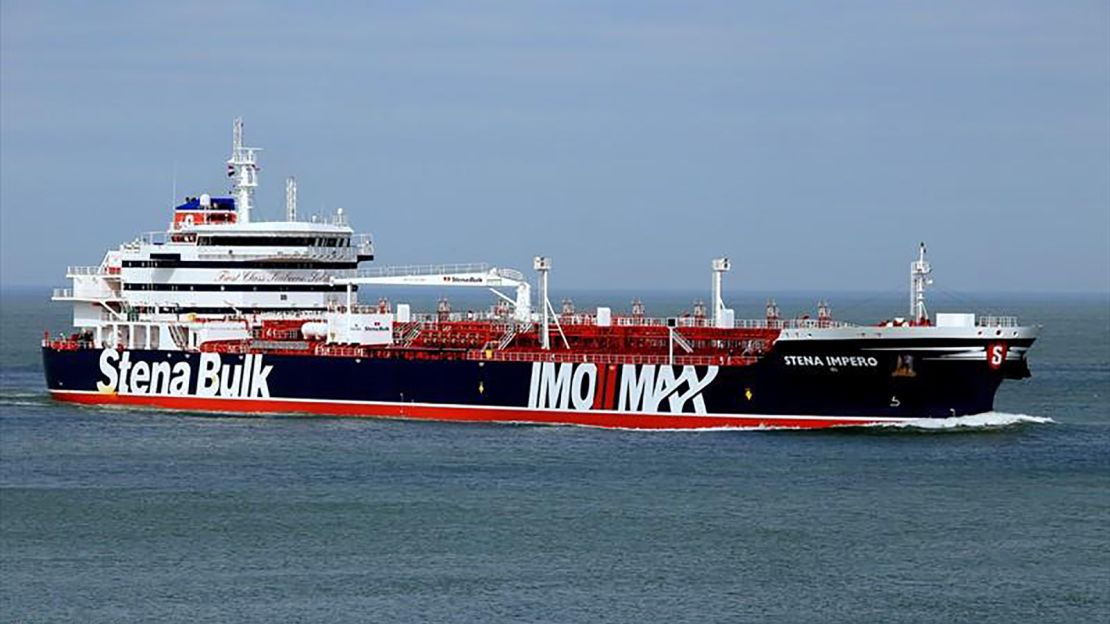Iran announced the capture of one British-flagged ship in the narrow Strait of Hormuz on Friday, and US officials said that a second had also been seized.
Iran’s Islamic Revolutionary Guard Corps (IRGC) said that its navy had captured the British-flagged oil tanker, Stena Impero, according to Iran’s state-run Press TV. The IRGC accused the tanker of “violating international regulations,” to Press TV.
The Stena Impero had turned off its tracker and ignored warnings, Press TV also reported, citing Iranian military sources. US defense officials confirmed that the tanker had been seized.
Later in the day, US officials told CNN that another ship – the Liberian-flagged MV Mesdar tanker – had also been seized by Iran on Friday.
But Iranian military officials denied that Mesdar had been seized, Press TV reported, citing informed military sources. The ship was “shortly stopped and briefed by Iranian authorities on maritime security and harmless navigation,” Press TV said.
Mesdar’s manager, Norbulk Shipping UK, confirmed in a statement that the ship had been released. “Communication has been re-established with the vessel and Master confirmed that the armed guards have left and the vessel is free to continue the voyage,” Norbulk Shipping said. “All crew are safe and well.”
On Friday evening, the Mesdar was seen headed in a western direction into the Gulf, instead of north to Iran, according to MarineTraffic.com tracking data.
The Stena Impero
The Stena Impero was heading to Saudi Arabia’s port of Al-Jubail from the UAE port of Fujairah when it was seized by the IRGC, the semi-official Fars news agency reported citing a statement from the IRGC.
The statement said the ship was making an entry from the exit point of the Strait of Hormuz in the south, “disregarding the established procedures that require all entries be made through the northern pass,” Fars reported, adding that the ship has been escorted to Iranian coastal waters for further legal procedures and investigations.
According to a statement by the Stena Impero’s owner, Stena Bulk, and operator, Northern Marine Management, the ship is Swedish-owned and there are 23 seafarers on board of Indian, Russian, Latvian and Filipino nationality.
The Stena Impero was first “approached by unidentified small crafts and a helicopter during transit of the Strait of Hormuz while the vessel was in international waters” at approximately 4 p.m. local time (12 p.m. ET), the company said.
More than six hours later, the ship was “no longer under the control of its crew” and “uncontactable,” according to the company.
Richard Meade, the managing editor of shipping industry publication Lloyds List, described the significance of the Stena’s seizure as “huge” for the region.
Heightened tensions
In a statement on Friday evening, UK Foreign Secretary Jeremy Hunt said that he was “extremely concerned by the seizure” of the two vessels, and noted that the ships’ crews were comprised of a number of nationalities but that no British citizens were on board either ship.
“These seizures are unacceptable. It is essential that freedom of navigation is maintained and that all ships can move safely and freely in the region,” he said. He added that the British Ambassador in Tehran is in contact with the Iranian Ministry of Foreign Affairs to “resolve the situation.”
Hunt also said that there would be “serious consequences ” if the situation was not quickly resolved, Reuters reported. “We’re not looking at military options, we’re looking at a diplomatic way to resolve this situation,” he emphasized.

A UK government official told CNN on Friday that the UK has convened a COBRA meeting – an emergency response committee that meets when there’s a domestic or international crisis – on the seized tanker.
On Friday afternoon, US President Donald Trump said the US would work with Britain, and claimed that the episode proved his warnings about Iran correct. “This only goes to show what I’m saying about Iran. Trouble. Nothing but trouble,” he said.
Trump also said that the US has “very few tankers going in” the area, but said the American military presence was nevertheless robust.”We have a lot of ships there that are warships,” he said.
On Friday evening, the US military was monitoring the transit of a US commercial cargo ship through the Strait of Hormuz, initially using armed aircraft overhead, according to a US defense official with direct knowledge of the situation. Continuous monitoring of the transit, which typically takes six to eight hours, is being done mainly by unarmed surveillance aircraft overhead that can call in other forces if needed.
An escalating series of maritime episodes
The Stena Impero’s seizure is yet another in an accelerating series of recent maritime episodes involving Iran.
On Thursday, the US Navy destroyed an Iranian drone using electronic jamming, a US defense official told CNN. The crew of the USS Boxer took defensive action against the Iranian unmanned aerial vehicle after it came close to the US naval ship, the official said.
Chief Pentagon Spokesperson Jonathan Hoffman said then that the USS Boxer had been in international waters where it was “conducting a planned inbound transit of the Strait of Hormuz.”
US President Donald Trump said the Iranian drone was “threatening the safety of the ship and the ship’s crew” and was “immediately destroyed.”
However, Iranian officials say none of their drones have been downed.
In another incident last week, armed Iranian boats tried unsuccessfully to impede the passage of a British oil tanker in the Persian Gulf, according to two US officials with direct knowledge of the incident.
And in June, tensions between the US and Iran escalated into a military standoff after an American drone was shot down by Iran over the Strait of Hormuz, one of the world’s most vital shipping routes.
Clarification: This article has been updated to add more detail regarding the US military’s monitoring of the transit of a US commercial cargo ship through the Strait of Hormuz.
CNN’s Max Ramsay, Chandler Thornton, Sara Mazloumsaki, Schams Elwazer, Nada Bashir, and AnneClaire Stapleton contributed to this report.





